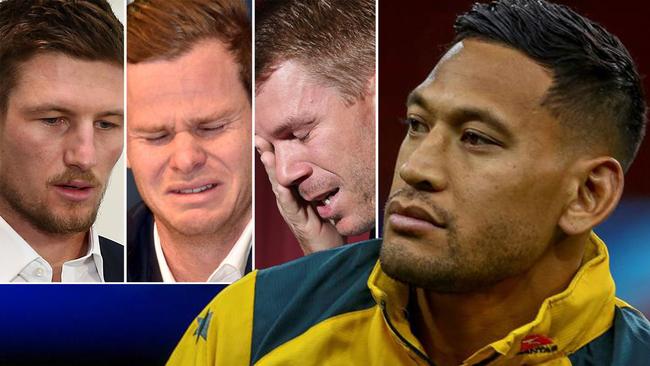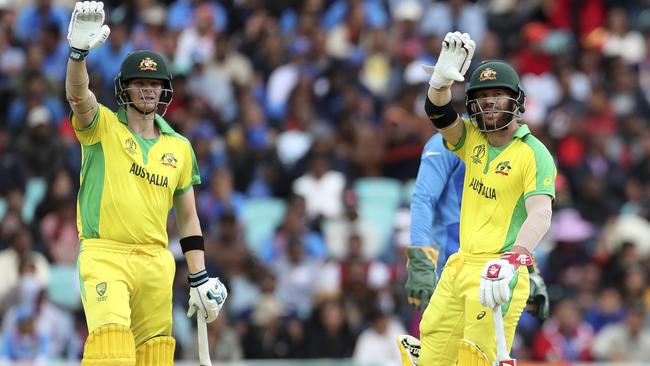Israel Folau penalised with life ban for ‘sin’ of Christianity

It certainly differs from the treatment of cricketers Cameron Bancroft, Steve Smith and David Warner, penalised rationally for cheating during a Test.
Rugby Australia acknowledges that players have the right to express their personal views on social media respectfully, including their religious views. As a Christian commentator I’d like to offer some observations on the religious and justice issues at play.
All evidence from Folau and others within the rugby community is that he is a respectful person, his actions consistent with his enthusiasm for his beliefs and his background of commitment to the New Testament.
MORE: Australian Christian Lobby says leaders they “cannot wash their hands’’ of Israel Folau’s case “like Pontius Pilate” | Janet Alrechtsen writes: Israel Folau’s treatment is a solid-gold lesson in how to create a martyr | Graham Richardson writes: If Folau has lived a perfect life then he should be in the running to make sainthood
In analysing his almost 300 Instagram memes, I see an earnest Christian seeking to encourage others, not trying to slam into anybody.
Folau’s now notorious post simply warns people of various sins that, if ongoing, will prevent people from receiving the best God has for them. It encourages them to return to God through Jesus’ salvation.
Folau adds the words: “Jesus Christ loves you and is giving you time to turn away from your sin and come to him.” Despite claims that this is hatred from Folau, when interpreted carefully it does not express hatred.
More widely, the Bible expresses several unpalatable truths about human actions on the way to urging us to accept God’s love. So if Folau had loaded up (say) a passage from the New Testament book Romans, “for all have sinned and fallen short of the glory of God”, it might have escaped scrutiny, yet it assigns every single person as sinful and needing God’s help.
In today’s climate, how can you respectfully warn and encourage someone of the spiritual consequences to some actions?
From my religious experience — including 36 years as an Anglican priest — warning people of changes required to follow God can sometimes create animosity. This is particularly the case concerning things we see as essential to our view of ourselves. Most Australians understand this.
For instance, if I go to a doctor and it is suggested I might lose some weight, I might feel resentful perhaps and take the advice personally. Yet I have been respectfully told something I need to hear.
Folau is a magnificent international player, some say our best (just watch 30 minutes on YouTube of him playing for Australia or NSW), so the decision of Rugby Australia to pursue the matter in initially prejudging him before proper process, then terminating his contract, has brought national disgrace. And the penalty dished out bears no relation to reality and echoes other gravely mistaken decisions we have seen in previous decades.
As the furore continues, quite rightly through the key drivers of religious freedom and freedom of expression, let’s not forget the issue of Folau’s post and his absurd penalty.
Sporting history (we are talking about sport, not treasonable behaviour) teaches that Fraser, Norman and Folau now share the ignominy of entirely disproportionate penalties for actions off the field.

Fraser ruffled feathers over uniform breaches and marching in the Olympic opening ceremony and allegedly pinching a flag at the 1964 Olympics (although the Japanese soon gave her another). Banned for 10 years by officials, later reduced to four years, she was then past competing competitively.
Norman won a silver medal in the 200m sprint at Mexico. On the dais he wore an Olympic Project for Human Rights badge as John Carlos and Tommie Smith gave their famous “black power” salute. Not officially banned, Norman was effectively excluded by missing out on selection for the Munich Olympics four years later, despite being the fifth fastest athlete in the world over his distance. He immediately retired.
It seems we have not learned from Fraser and Norman. That in 2019, for a so-called misdemeanour nowhere near the field, Folau had a contract terminated that equals a career-ending life ban, seems reprehensible.
And whether or not these three athletes committed any offence, the penalties are strikingly inappropriate. Indeed, we have gone backwards in Folau’s case.
Contrast Bancroft, Smith and Warner, who share the ignominy of premeditated cheating in the dressing-room and on the field, and who endured a reasonably assessed penalty. Every cricketer who has ever bowled a ball or played the game at any level knows tampering with the ball is cultural cricketing death, yet an Australian player, by agreement and knowledge of two teammates, cheated on the field in a Test match.
We can argue the point on the level of their penalty but, compared with Fraser, Norman and Folau, involved in off-field incidents, our cricketers might feel satisfied with their penalty for an on-field sin. Just now two of them are enjoying recycled success at the ICC World Cup.
Most Australians do see the massive overreach of the extent of Folau’s penalty. It looks quite unjust. The end result at present does not say to Folau or anyone “be respectful”. It says more “don’t speak at all about these things”, and if you do you are not welcome.
Folau has been sacrificed by Rugby Australia’s wooden and inflexible approach. Talk about getting a sledgehammer out to smash an almond. It is hard to watch the ridiculous nature of these actions. I for one do not believe, even if Folau is found to have committed some indiscretion, that a life ban makes any justifiable sense.
Neil Bach is a retired Anglican minister living in Melbourne.



Israel Folau’s unjust penalty for off-field behaviour, through a single personal social media comment, is akin to the shameful treatment of Olympians Dawn Fraser and Peter Norman.